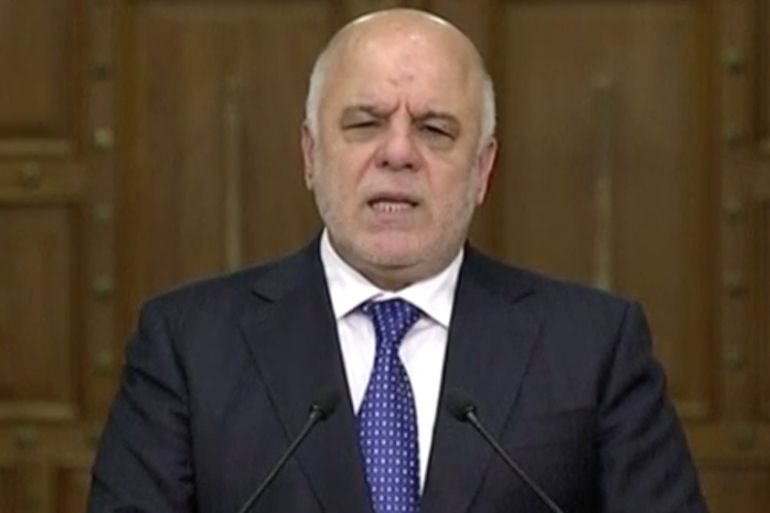How will US withdrawal from Iran nuclear deal influence Iraq?
Iraq will be caught in the middle of the anti-Iran approach the US is adopting, analysts say.

Iraq’s political progress will likely be hindered by the US’ decision to withdraw from the Iran nuclear deal, analysts say, since the two rival countries continue to back different sides in Iraq.
As Iraq gears up for its first parliamentary elections on Saturday since the defeat of Islamic State of Iraq and the Levant (ISIL) last year, experts say the roles played by the US and Iran over the past several years have heavily influenced Iraq’s political scene.
While the US backs the government of Prime Minister Haider al-Abadi, Iran backs Shia-dominated paramilitaries loyal to its Islamic Revolutionary Guard Corps.
According to experts, the US and Iran’s influence in Iraq date back to the US-led invasion in 2003, which removed former President Saddam Hussein from power.
The US then ordered the dismantlement of Iraq’s army and banned the Sunni Baath Party from government under the de-Baathification law.
The Baath party had been in power for 40 years prior and, under the new law, many Iraqis who were party affiliates lost their jobs. Consequently, an estimated 400,000 people became marginalised in Iraqi society.
The US appointed Nouri al-Maliki – a Shia politician, who targeted and marginalised Sunnis and Kurds during his tenure – as prime minister, leading to a sectarian war that resulted in the displacement of more than one million Iraqis between 2006 and 2008.
Iraqi elections
Saturday’s election is seen as different from previous ones mainly because “regional issues are playing a more important role than the local ones”, Haider Saeed, editor-in-chief of the Siyasat Arabiya journal, told Al Jazeera.
|
|
Iraqis fear deteriorating US-Iran relations may threaten the country’s first attempt at creating a nationalist government that surpasses sectarian and intra-political divides.
“Haider al-Abadi was successful in balancing US and Iran interests in the past, but it’s going to be much harder for anyone to sustain that,” Saeed said.
“US involvement this time around is greater than it ever was before,” he added.
Aymenn Jawad al-Tamimi, Middle East Forum analyst, told Al Jazeera the “US government generally considers it important to maintain influence in Iraq as a counter to Iranian influence.”
“It’s more about limiting Iranian influence and preventing dominance of pro-Iranian factions in Iraq’s government and security sector,” he said.
Geostrategic depth
Renad Mansour, research fellow at Chatham House, told Al Jazeera Iraq’s geostrategic importance is another reason why the US wants to keep its influence in the country.
“Maintaining a friendly Iraqi government is important [for the US] for geopolitical calculations in the region,” Mansour said. “If the US loses Iraq, it loses a considerable amount of influence in the area.”
In the past, the US had seemed indifferent to Iranian influence in Iraq, but Saeed argues that in the near future, Iraq will be forced to choose which ally to keep.
“In the next few years the US administration will be asking Iraqi leadership where do they stand on the disputes with Iran and which side will they stick with,” Saeed said. “Iraqi leadership will be put in an awkward position.”
Iran is expected to respond to the US’ aggressive language towards it and the nuclear deal abandonment by working to further solidify its influence in neighbouring countries.
Mahjoob Zweiri, director of the Gulf Studies Center at Qatar University, said Iran has already started laying the groundwork.
How this is going to affect Iraq’s general election is unclear, said Zweiri. “The outcome of the [tension] appeared early when Iran tried last week to raise question marks about Abadi’s legitimacy to be prime minister, and tried to play down his ability to be elected.”
|
|
Sending messages
Al-Abadi, who is expected to continue as prime minister for a second term, has managed to maintain a balanced relationship with the US, Iran and Saudi Arabia.
However, he is considered by some within Iraq as pro-US, which might hamper his political image going forward.
“Iran is trying to send a clear message to the US that if you want to pressure Iran on the nuclear deal, we have a response to that, and the first will be in Iraq,” Zweiri said.
“Of course, Iraq is not the only platform where they try to send messages. The Lebanese election was a clear message as well where we saw the result in favour of Hezbollah.”
The Iran-backed Shia party won a small minority in Lebanese parliament on May 6.
Zweiri added Iran would likely capitalise on the political gains in Lebanon to communicate to the US that deteriorating relations would reflect on the entire region.
According to Mansour, this is highly likely especially in light of the US exiting the Iran nuclear deal.
“The withdrawal will give more power to the so-called conservative factions of the [Iranian] leadership and they have to do something [as a response] and show their own people,” he said.
But Mansour warned Tehran will have to be careful in its engagement as anti-Iranian sentiment is growing in Iraq.
“The challenge to Iranian influence is happening on the streets, and if the US can harness that, it will do the job for them.”